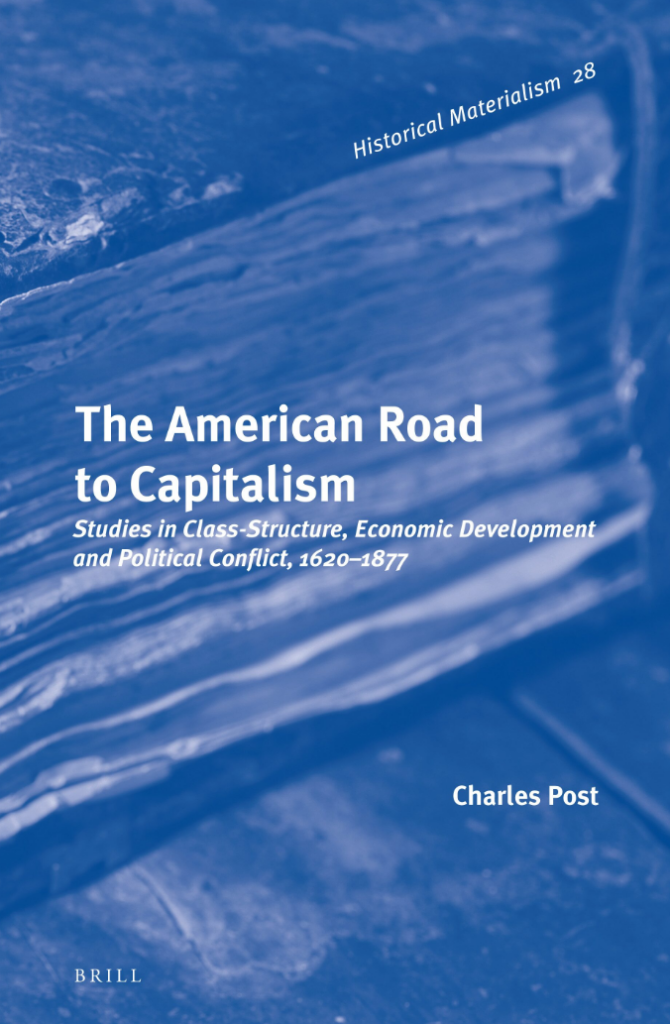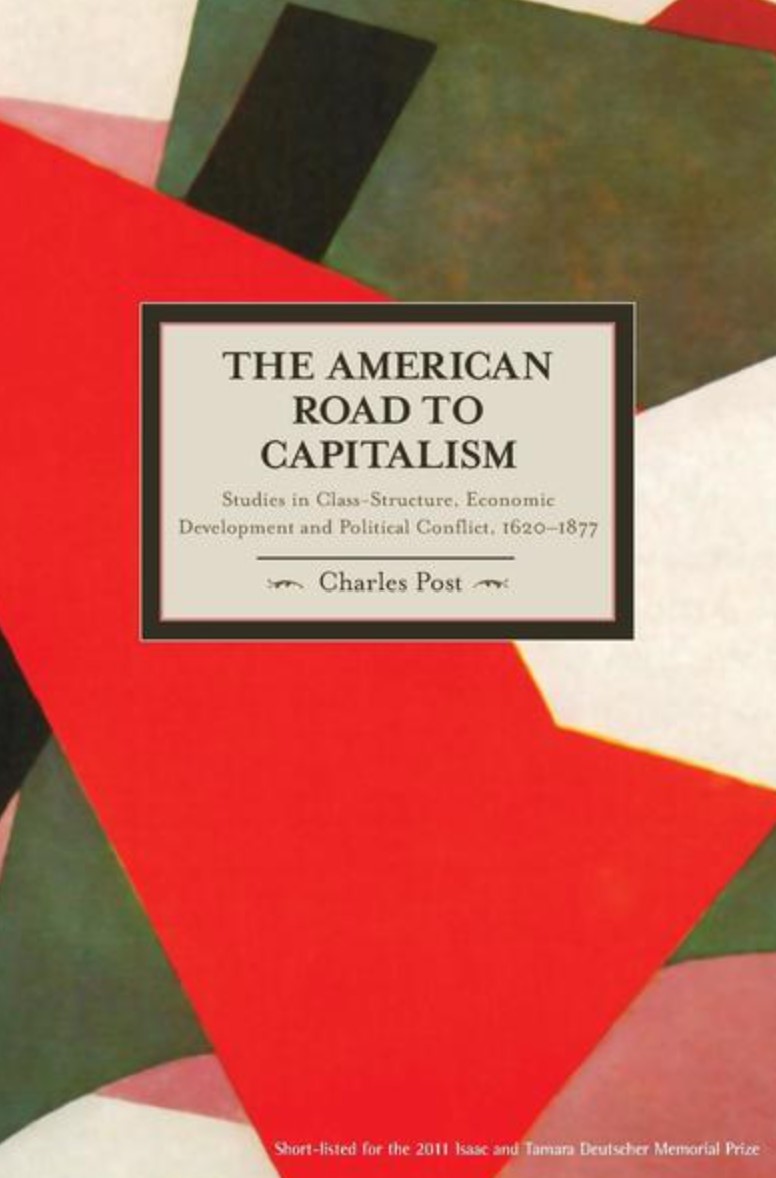Charles Post, Borough of Manhattan Community College
Most US historians assume that capitalism either “came in the first ships” or was the inevitable result of the expansion of the market. Unable to analyze the dynamics of specific forms of social labour in the antebellum US, most historians of the US Civil War have privileged autonomous political and ideological factors, ignoring the deep social roots of the conflict. This book applies theoretical insights derived from the debates on the transition to capitalism in Europe to the historical literature on the US to produce a new analysis of the origins of capitalism in the US, and the social roots of the Civil War.
Winner of the Paul Sweezy Marxist Sociology Book Award 2013
Short-listed for the 2011 Isaac and Tamara Deutscher Memorial Prize.
Biographical note
Charles Post, Ph. D. (1983) in Sociology, SUNY-Binghamton, is Associate Professor of Sociology at Borough of Manhattan Community College-CUNY. He has published in New Left Review, Journal of Peasant Studies, Journal of Agrarian Change, Against the Current and Historical Materialism.
Readership
All those interested in Marxian history and theory, the origins and trajectory of capitalism, the economic development of the US and the origins and outcome of the US Civil War.
Reviews
[…] a remarkable collection of essays […]
Bill Dunn, Progress in Political Economy
[…] Posts theoretisch reichhaltiges und durchgängig überzeugendes Buch [ist] ein unverzichtbarer Beitrag.
Geoff Kennedy (Aus dem Amerikanischen von Ingar Solty), Das Argument (Journal for Philosophy and Social Sciences), 299 (5/2012), pp. 771-773
Charlie Post’s The American Road to Capitalism is a magisterial text that deserves a close reading, in particular by scholars attempting to make sense of 20th century capitalism in the United States.
Jordy Cummings, Socialist Studies / Études socialistes, 8 (1) Winter 2012, pp. 312 -314
This is a thoughtful, learned, stimulating, challenging and altogether valuable volume.
Bruce Levine, University of Illinois, ATC 15, January/February 2012
Charles Post’s new book, The American Road to Capitalism,is sure to become a reference point for debates among historians and Marxists about the transformation of the English colonies into the fully developed capitalist United States. […] it should be widely read, appreciated for its insights and rigor, and also debated.
Ashley Smith, International Socialist Review, pp 66-70
Explaining the origin and early development of American capitalism is a particularly challenging task. It is in some ways even more difficult than in other cases to strike the right historical balance, capturing the systemic imperatives of capitalism, and explaining how they emerged, while doing justice to historical particularities… To confront these historical complexities requires both a command of historical detail and a clear theoretical grasp of capitalism’s systemic imperatives, a combination that is all too rare. Charles Post succeeds in striking that difficult balance, which makes his book a major contribution to truly historical scholarship.
Ellen Meiksins-Wood, York University, author of The Origins of Capitalism: A Long View.
In The American Road to Capitalism, Charles Post offers a brilliant reinterpretation of the origins and diverging paths of economic evolution in the American north and south. The first systematic historical materialist account of US development from the colonial period through the civil war in a very long time, it is sure to be received as a landmark contribution.
Robert P. Brenner, University of California-Los Angeles, author of Agrarian Class Structure and Economic Development in Early Modern Europe and Merchants and Revolution: Commercial Change, Political Conflict, and London’s Overseas Traders, 1550-1653.
Charles Post has written an excellent book on the origins of American capitalism in the antebellum North, on plantation slavery in the Old South and on the cataclysmic conflict between them. His interpretation is bold and controversial; it will have to be considered by all scholars in the field.
John Ashworth, University of Nottingham, author of Slavery, Capitalism and the Antebellum Republic.
This is the most original and provocative materialist interpretation of the origins and dynamics of US capitalism for a long time. Post combines impressive command of the historical sources with a sharp analytical understanding, not least of the centrality of agrarian questions to the development of capitalism.
Henry Bernstein, University of London, School of Oriental and African Studies and China Agricultural University, Beijing, emeritus editor Journal of Agrarian Change.
Over the past three decades, Charles Post has been developing an original and powerful interpretation of the American road to capitalism. This volume brings together his most important essays in what is sure to be a landmark volume. Post brilliantly analyzes the structural basis of economic development in both the North and the South, culminating in a powerful interpretation of the social basis of the Civil War. The book is one of the best examples of historical sociology that I have seen in recent years, effortlessly melding theory and historical research. This is engaged scholarship of the highest order.
Vivek Chibber, New York University, author of Locked In Place: State Building and Late Industrialization in India.
Table of contents
Foreword by Ellen Meiksins Wood
Introduction
1. The American Road to Capitalism
i. Plantation-slavery
ii. Agrarian petty-commodity production
iii. Capitalist manufacture and industry
iv. Conclusion: the Civil War
2. The Agrarian Origins of US Capitalism: The Transformation of the Northern Countryside before the Civil War
i. Rural class-structure in the North before the Civil War
ii. Debating the transformation of northern agriculture
iii. The transformation of the northern countryside, c. 1776–1861
3. Plantation-Slavery and Economic Development in the Antebellum Southern United States
i. The ‘planter-capitalism’ model
ii. The ‘non-bourgeois civilisation’ model
iii. Class-structure and economic development in the antebellum-South
4. Agrarian Class-Structure and Economic Development in Colonial British North America: The Place of the American Revolution in the Origins of US Capitalism
i. The commercialisation-staples model
ii. The demographic-frontier model
iii. Agrarian social-property relations in colonial British North America
iv. Colonial economic development, the American Revolution, and the development of capitalism in the US, 1776–1861
5. Social-Property Relations, Class-Conflict and the Origins of the US Civil War: Toward a New Social Interpretation
i. Ashworth’s social interpretation of the US Civil War
ii. A critique of slavery, capitalism and politics in the antebellum-republic
iii. Toward a new social interpretation of the US Civil War
Conclusion: Democracy against Capitalism in the Post-Civil-War United States
i. Democracy against capitalism in the North: radicalism, class-struggle and the rise of liberal democracy, 1863–77
ii. Democracy against capitalism in the South: the rise and fall of peasant-citizenship, 1865–77
iii. The defeat of populism, ‘Jim Crow’ and the establishment of capitalist plantation-agriculture in the South, 1877–1900
References
Index


